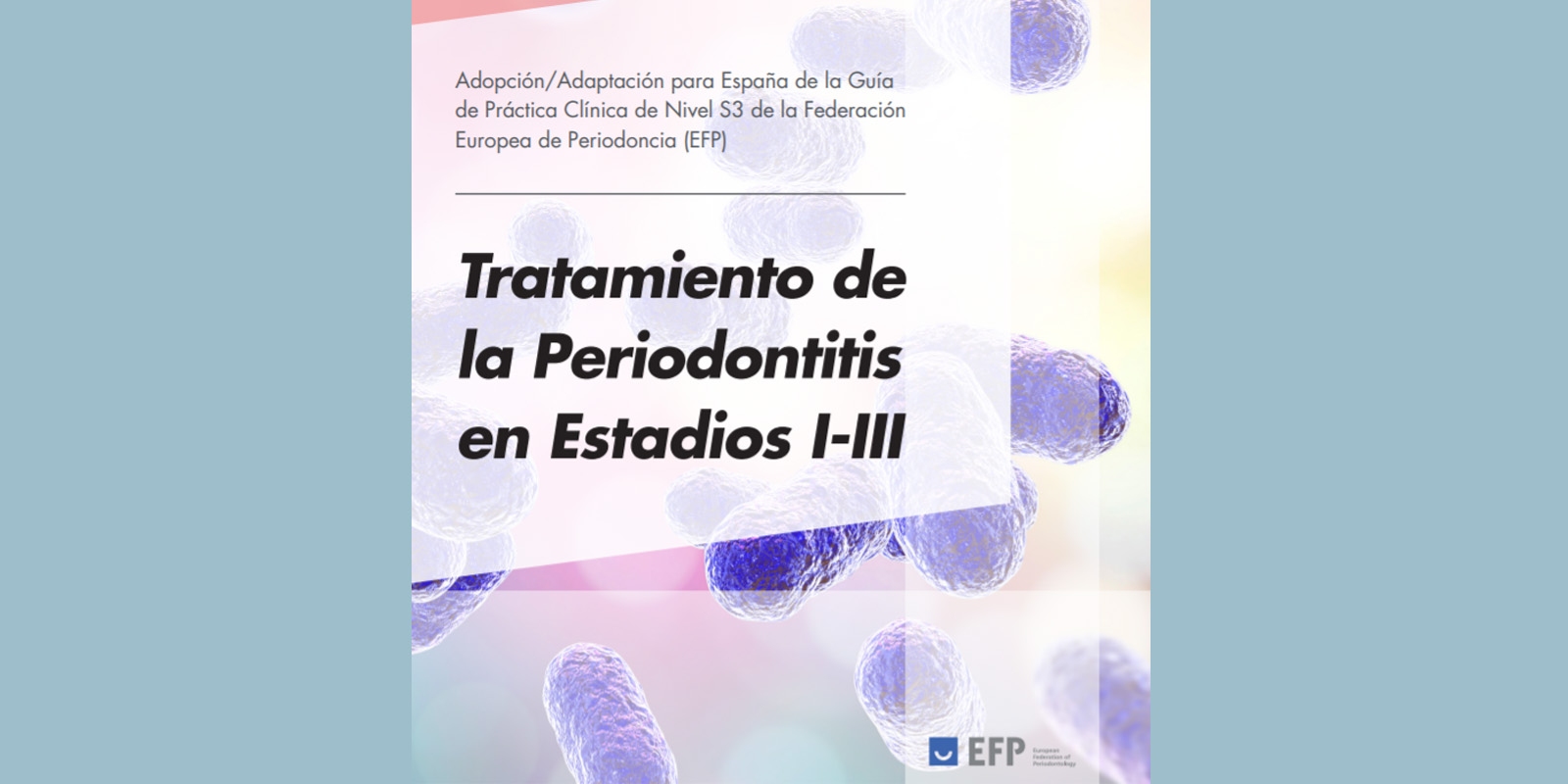DENTAID EXPERTISE
News for dentistry professionals
MANAGING PERI-IMPLANT DISEASE, A CHALLENGE FOR PERIODONTICS
09 May 2018

Peri-implant disease is one of the main threats to implant therapy, which is why it is necessary to implement preventive, diagnostic, therapeutic and patient monitoring measures to help prevent and reduce the incidence of this pathology.
Over 50% of implant patients in Spain develop peri-implantitis and/or peri-implant mucositis, which highlights the growing prevalence of this health problem here, especially when considering the consequences for general health and for the prognosis of the implant.
All this raises the issue of the need for the implementation of preventive, diagnostic and therapeutic measures, and the monitoring of patients to help to minimise this problem. From a diagnostic standpoint, there is much to be done, as Dr. Jan Derks will highlight in a lecture he will give at the SEPA Meeting in 2018, set to take place in Seville in April.
A THREAT
The magnitude of the problem is such that some of those considered the creators of periodontics have shown their concern about peri-implant diseases.
Thus, among the future challenges awaiting experts in periodontics and implant therapy, Dr. Robert J. Genco does not hesitate to cite the emerging problem posed by peri-implantitis. “I have practiced periodontics for 35 years and have fitted numerous implants. In the beginning, Buffalo was a place of reference for implants, so I have seen many implant failures during that time which were very different from those being carried out today,” he says.
In particular, on the problem of peri-implantitis, he acknowledges that “it is a truly complicated issue in terms of clinical management. In my opinion, it's a big problem.” However, Genco claims that “it can be prevented.” The main thing is to try to prevent the problem from arising, because once the disease emerges, it is very difficult to stop it. Additionally, “the consequences are really tough, emotionally and surgically speaking. Removing these failed implants is a problem, since they have usually fused with the bone; therefore, the bone that has melded around the implant has to be removed. It is a major operation and that is why prevention is fundamental. The consequences of having to remove the implant under these conditions are frightening.”
Likewise, according to Professor Niklaus Lang, “peri-implant disease is one of the main threats that cloud the brilliant present and future of implant therapy.” Hence, in his opinion “prevention of peri-implant disease is basic” and “must necessarily be built up upon achieving periodontal health prior to the placement of the implants, by performing thorough periodontitis treatment.”
Ultimately, for Professor Niklaus Lang “the best prevention of peri-implantitis necessarily involves achieving adequate periodontal health before fitting the implants, prioritising the management and care of the soft tissues surrounding the implant and involving the patients in the maintenance program.”
FOCUSING ON DIAGNOSIS
From a diagnostic perspective, it is also possible to find new options to optimise early detection, and therefore the rapid and efficient management of the main peri-implant diseases, as Dr. Jan Derks will highlight at the SEPA Meeting. After the publication of his doctoral thesis and several high impact articles on peri-implantitis, this expert from the University of Gothenburg is currently an international reference on the diagnosis and treatment of peri-implant diseases. He will highlight the seriousness of these increasingly prevalent pathologies and how to make their proper diagnosis in a monographic session on peri-implantitis on April 12, 2018.
His lecture will include data from the largest observational study conducted to date on the subject and will also summarise the main conclusions from the World Workshop held in Chicago in November 2017. “The information I will present is relevant to all physicians involved in restorative implant therapy and will be useful in clinical practice,” assures Dr. Derks.
And the fact is that the prevalence of peri-implant diseases in developed countries is an issue that is of particular concern for this expert. “Our data shows that approximately 15% of all implant patients showed very obvious signs of peri-implantitis. These patients must be cared for, a considerable challenge for all of those of us who work as dental professionals. This explains the great interest in the studies on the prevention and treatment of peri-implantitis,” he says.
Regarding the diagnosis of peri-implant diseases, Dr. Jan Derks stresses that “what we need in order to make the right diagnosis is a periodontal probe and radiographic images of marginal bone levels. We already have these tools at our disposal. In this context, dental professionals working with implant-supported restorative therapies must be aware of the importance of adequate reference documentation.”
Studies on the prevalence of peri-implantitis generally work with well-defined thresholds, by identifying bone loss (e.g. two millimetres). For everyday clinical diagnosis, Dr. Derks points out, “thresholds are less relevant” and in fact he recommends that “in the presence of soft tissue inflammation, and if marginal bone loss is detected, it is to be diagnosed as peri-implantitis.”
In any case, as Dr. Derks points out, “the key to success in the management of peri-implantitis is, necessarily, early diagnosis and a very practical clinical approach based on adequate care for the patient.”
SITUATION IN SPAIN
Practically one of every four dental implant patients in Spain has peri-implantitis, as revealed by a pioneer study in our country promoted by the SEPA. The first cross-sectional descriptive epidemiological study published in Spain, with random sampling rather than convenience sampling, shows a prevalence of peri-implantitis of 24%, with a mean follow-up period of 8-9 years. It is just one of the many interesting discoveries in this work of reference, soon to be published in a high impact scientific journal.
This endeavour is the result of the work carried out for over more than five years by a team of professionals appointed by SEPA to develop the most important epidemiological research study protocol on peri-implant diseases to be carried out in our country and one of the most relevant worldwide.
Data collection began over two years ago with the participation of more than 60 Spanish professionals in a balanced sample designed by Dr. Juan Carlos Llodrá, with the determination of over 20 clinical and radiographic variables. Dr. Llodrá was joined on the coordinating team of this study by Drs. Daniel Rodrigo, Elena Figuero and Ignacio Sanz Sánchez.
The objective was to ascertain the prevalence of peri-implant disease in our country and its possible associated variables. The coordinators of the study consider that, from a methodological point of view, it is one the most important works published to date.
According to Dr. Llodrá, who presented these results at SEPA Málaga '17, “this is a pioneer, multicentric national study carried out in the scope of private practice, which includes a large sample of dentists who fit implants in Spain, providing a clear, reliable picture of the problem.”
RELATED ARTICLES

17 Feb 2022
EuroPerio Series: professional discussions and scientific exchange
To keep the global perio community up to date with the latest research findings as well as give a taster of what is to come at EuroPerio10, the…

21 Jan 2022
Xerostomia in COVID-19 positive patients: clinical considerations
Severe Acute Respiratory Syndrome Coronavirus 2 (SARS-CoV-2) the cause of the pandemic known as COVID-19, affects different organs and systems (lungs,…

20 Jan 2022
A guide adapted to Spain to optimise the approach to periodontitis
There are currently numerous clinical practice guidelines to direct the treatment of many systemic diseases (such as diabetes, depression,…
Sign up for the DENTAID Expertise newsletter
Sign up for the newsletter